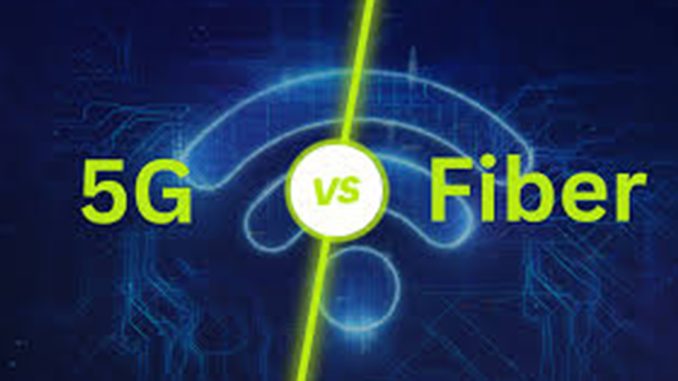
Introduction
With internet usage at an all-time high, choosing the right connection is more important than ever. Two of the fastest options available today are 5G wireless networks and fiber-optic internet. While both offer impressive speeds and performance, they serve different needs and situations.
In this guide, we’ll compare 5G vs Fiber Internet to help you decide which is better for your home, work, or lifestyle.
What Is 5G Internet?
5G is the fifth generation of mobile network technology. It provides high-speed wireless internet using cellular signals. Unlike previous generations (3G, 4G), 5G delivers extremely fast download speeds, low latency, and the ability to connect many devices at once.
It’s available in two forms:
-
Mobile 5G: For smartphones and tablets.
-
Home 5G: A wireless internet solution for households using a 5G router or modem.
Pros of 5G Internet:
-
Easy to install (no cables required)
-
High speeds (up to 1–3 Gbps in some areas)
-
Portable – use it anywhere with coverage
-
**Good for rural or urban areas without fiber access
Cons of 5G Internet:
-
Signal can be blocked by walls or buildings
-
Speeds vary by location and network congestion
-
Limited availability in some regions
What Is Fiber Internet?
Fiber-optic internet uses glass or plastic cables to transmit data using light. It’s currently the fastest and most stable type of internet connection, offering symmetric speeds—meaning your upload and download rates are the same.
Fiber is ideal for heavy internet users, remote workers, gamers, and streamers who require reliable, high-bandwidth connections.
Pros of Fiber Internet:
-
Lightning-fast speeds (up to 10 Gbps)
-
Extremely stable and low latency
-
Great for multiple users and smart homes
-
Not affected by weather or signal interference
Cons of Fiber Internet:
-
Installation requires wiring, which can be costly or time-consuming
-
Limited availability in rural or underdeveloped areas
-
Not portable – fixed to your home or building
5G vs Fiber Internet: Feature Comparison
| Feature | 5G Internet | Fiber Internet |
|---|---|---|
| Speed | Up to 1–3 Gbps (variable) | Up to 10 Gbps (consistent) |
| Latency | 10–30 ms (low, but not lowest) | <5 ms (very low) |
| Reliability | Can vary due to interference | Extremely reliable |
| Portability | Portable and wireless | Fixed to location |
| Installation | Easy setup with modem/router | May require technician and cabling |
| Availability | Expanding across cities globally | Limited to developed regions |
| Ideal For | Moderate use, renters, mobility | Heavy use, remote work, gaming |
Which Is Better for You?
Choose 5G if:
-
You need quick setup and don’t want installation hassles.
-
You live in an area without fiber infrastructure.
-
You value mobility and plan to move often.
-
You are a moderate internet user who mainly browses, streams, or works from the cloud.
Choose Fiber if:
-
You need ultra-fast and stable speeds for multiple users.
-
You work from home and use video conferencing, large uploads, or real-time collaboration tools.
-
You’re a hardcore gamer or content creator.
-
You want future-proof internet for your smart home.
Conclusion
Both 5G and fiber internet are excellent choices, but they suit different needs. 5G offers flexibility, portability, and decent speed—great for people on the move or in areas without access to wired connections. Fiber, on the other hand, is the gold standard for high-performance internet with unmatched stability and speed.
Consider your location, lifestyle, and internet habits to make the best choice. Whether you choose fiber or 5G, both are powerful technologies driving the future of connectivity.
